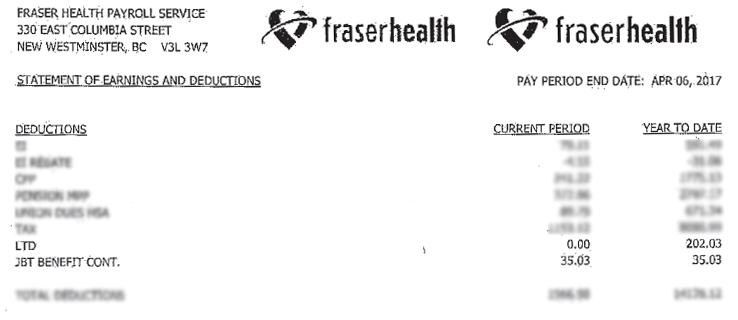To: All CUPE Members, CBA
The CBA represents more than 15,000 members, the majority of whom are BCGEU members. CUPE represents approximately 550 members in this sector in CUPE Locals; 15, 4816, 3403, 3495. The other unions represented are UFCW, HEU, HSA and USW.
Section 4 of the MOA established the comparability increases in the current collective agreement and gives approximately 80% of the FTEs (full time equivalents) in the Community Subsector comparability increases of 1% on April 1, 2016, 0.5% on April 1, 2017 and 0.5% on April 1, 2018. These increases will narrow the gap between Community and Facilities jobs doing the same or similar work, and which have comparable benchmarks.
We are pleased to confirm the process has now been completed and although it was not completed in time for the April 1, 2016 implementation date, the increases will be retroactive to April 1, 2016.
Wage increases for eligible employees will increase starting the first pay period after the following dates and at the respective rates:
- 1.0% April 1, 2016
- 0.5% April 1, 2017
- 0.5% April 1, 2018
The parties could not agree on the list of eligible classifications and went to arbitration. On June 17,2016 Arbitrator Vincent Ready delivered his Decision giving the comparability increases to the following eligible classifications:
Classification:
- Administrative Support 3
- Activity Worker
- Administrative Support 4
- Community Health Worker 2
- Resident Care Aide
- Support Worker 1
- Scheduler 1
- Scheduler 2
- Support Worker 2
The new wage rates, including the 0.5% general wage increase and 1.0% Comparability increase as of the first pay period after April 1, 2016 are as follows:
|
Old Grid
|
New Grid
|
Step 1
|
Step 2
|
Step 3
|
Step 4
|
|
5
|
5A
|
$17.68
|
$18.31
|
$18.90
|
$19.52
|
|
8
|
8A
|
$19.52
|
$20.12
|
$20.74
|
$21.34
|
|
9
|
9A
|
$20.41
|
$21.01
|
$21.64
|
$22.24
|
|
10
|
10A
|
$21.34
|
$21.94
|
$22.56
|
$23.15
|
The new wage grid showing the Comparability increases.
FAQ:
When will I get my increase?
You should receive your raise and retroactive payment within the next two pay periods.
How do I know if my job is included in one of the eligible classifications?
Check your job description. The classifications are the benchmarks contained in the Community Health Job Evaluation Plan. Each Employer develops job descriptions for the positions they need and matches the job descriptions to a classification (benchmark). There may be many different job descriptions matched to the same classification and each job description should show the classification it is matched to.
What if I have changed classifications and no longer work in one of the eligible classifications?
If you were in an eligible classification on April 1, 2016 and subsequently moved to a classification that is not eligible, you will receive payment for the hours you worked in the eligible classification from April 1, 2016 until the last day you worked under that classification.
What if I started working in an eligible classification after April 1, 2016?
You will receive the increase and retroactive payment back to your first day in the eligible classification.
What if I am red-circled and work in an eligible classification?
Red-circled employees who work in an eligible classification will receive the comparability increases and retroactive payment the same as other eligible employees. Your wage rate will not appear on the grid above. The increase will be 1% of your current rate of pay.
For more information, please see:
http://bcchs.cupe.ca/cba-updates/support-worker-2s-qualify-comparability
http://bcchs.cupe.ca/www/cba-updates/cba-update-comparability-increases
http://bcchs.cupe.ca/www/cba-updates/comparability-increases-call

